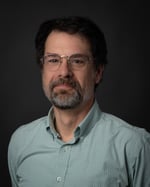
2024 Online Interactive or In-Person Turbomachinery Design for Supercritical CO2 Course: March 19 - 21
2.5 days hybrid format (Online interactive or In-Person at Concepts NREC Headquarters in White River Junction, Vermont USA)
March 19 - 21, 2024
8:30 am - 4:30 pm daily (Days 1 & 2)
8:30 am - 12:00 pm (Day 3)
Supercritical CO2 Cycle and Turbomachinery Design and Analysis Course
Interest in supercritical carbon dioxide (sCO2) in closed-loop power cycles and high-efficiency cooling has significantly increased in recent years. These applications benefit from the unique properties of CO2 near the critical point, but they also pose unique challenges for turbomachinery design.
This course seeks to educate the engineer on the basics of sCO2 turbomachinery design. We will identify the basic issues, tradeoffs, and limitations involved in laying out cycles and their sizing requirements. The special challenges related to turbomachinery design and analysis will be covered and the most suitable applications to sCO2 cycles will be discussed. Basic aerodynamic and structural design issues unique to sCO2 will also be emphasized. This course assumes some basic knowledge of thermodynamics, structural mechanics, and fluid mechanics concepts. Prior know-how of conventional turbomachinery design is beneficial but not required.
Course Schedule and Content
Supercritical CO2 Cycles and Sequestration
- Brayton cycle
- Recompression cycle
- Allam cycle
- Sequestration
Thermodynamic and Fluid Modeling Concerns
- Thermodynamic modeling options
- Accuracy and computational efficiency
History and Current Status of Supercritical Initiatives
- Past and Present supercritical CO2 projects around the world
Supercritical CO2 Analysis and Modeling
- Modeling approaches for nonlinear fluid properties
Mechanical Design and Material Selection
- Mechanical Design
- Material concerns for supercritical CO2
Sample Compressor Design for sCO2
- Example design of a sCO2 compressor
Bearing and Mechanical Design for sCO2
- Bearing and mechanical concerns required for sCO2
Sample Turbine Design for sCO2
- Example design of sCO2 compressor
Seals and Thrust Management
- Supercritical CO2 seal design
- Thrust analysis
Integration and Testing
- System integration of turbomachinery components
- Testing practices for sCO2
What You Will Learn
- An understanding of the benefits and challenges of sCO2 power cycles
- Introduction to the modeling and numerical methods required for sCO2 design
- Awareness of the special design consideration for sCO2 compressors and turbines
- Overview of advanced topics that bring special risks to sCO2 design
Note: Participants are expected to have a basic understanding of thermodynamics and fluid dynamic principles. Some prior knowledge of turbomachinery design principles is helpful but not essential.
Materials
The course materials have been developed over several years and reviewed to ensure that they are kept up-to-date. Student will receive the course materials by download link.
Instructors
Mark Anderson

Mark Anderson is the Chief Technology Officer at Concepts NREC. He has 30+ years of experience in turbomachinery design and fluid modeling. He earned his B.S. in Mechanical Engineering from Northeastern University and an M.A. from the Massachusetts Institute of Technology. Mr. Anderson has conducted a wide range of research in the areas of hypersonic propulsion, turbomachinery modeling, and computational fluid dynamics. He spearheaded Concepts NREC’s meanline development, geometry parameterization, and quasi-3D and full 3D CFD at Concepts NREC and was Vice President of Software Development for 10 years. He has authored or co-authored over 25 papers on turbomachinery, CFD, and environmental modeling.
Thomas Gresham

Thomas is a Senior Mechanical Design Engineer at Concepts NREC. He holds a B.S. and Master’s degree in Mechanical Engineering from the University of Virginia, specializing in rotodynamics and vibrations. Thomas joined Concepts NREC in 2022 where he has focused on delivering structural analysis, rotordynamics, bearing analysis, seal design, and test planning in addition to teaching sections for Concepts NREC’s advanced turbomachinery engineering training courses.